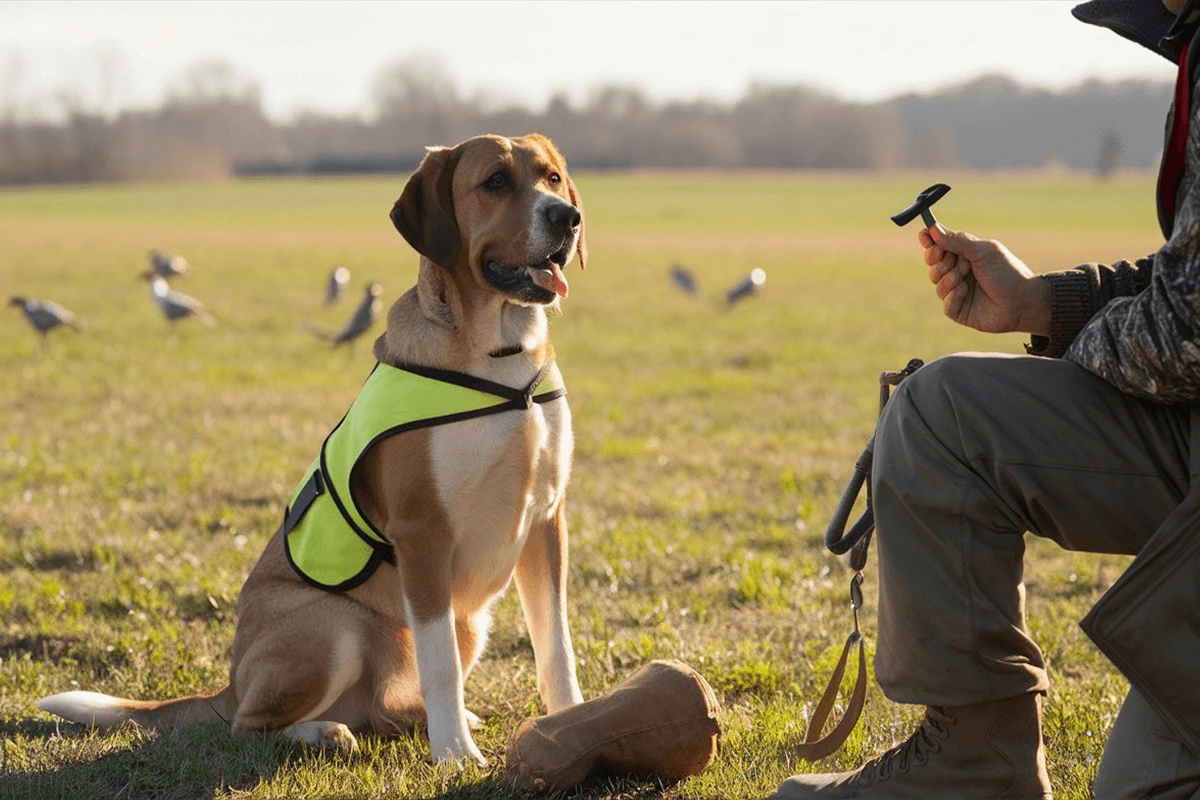Great hunting dogs are more than just companions; they are a reliable partners in the field. Hunters have relied on specialized dog breeds for centuries to track, retrieve, and flush out the game. These dogs have strong instincts, keen senses, and unmatched dedication to the hunt. Whether you’re chasing waterfowl, upland birds, or big game, the right hunting dog can make all the difference.
Not all hunting dogs excel in the same way. Some breeds specialize in retrieving waterfowl, while others shine in tracking and scent work. Choosing the best hunting dog depends on your hunting style, experience level, and the type of game you pursue. This list highlights ten of the most dependable hunting dog breeds—each known for their skill, intelligence, and unwavering loyalty.
If you’re a seasoned hunter or just starting out, this guide will help you find a loyal hunting companion that won’t let you down. Let’s dive into what makes these dogs the best in the field.
What Makes a Great Hunting Dog?
Hunting Dogs Hunting Instincts
A strong hunting instinct sets great hunting dogs apart from regular breeds. These dogs have an innate drive to locate, chase, and retrieve the game. Generations of selective breeding have refined their ability to follow scents, point at birds, or flush out hidden prey. Some breeds, like the Labrador Retriever, have a natural retrieval instinct, making them excellent for waterfowl hunting. Others, like the German Shorthaired Pointer, possess an exceptional ability to locate birds and hold their position until the hunter takes the shot.
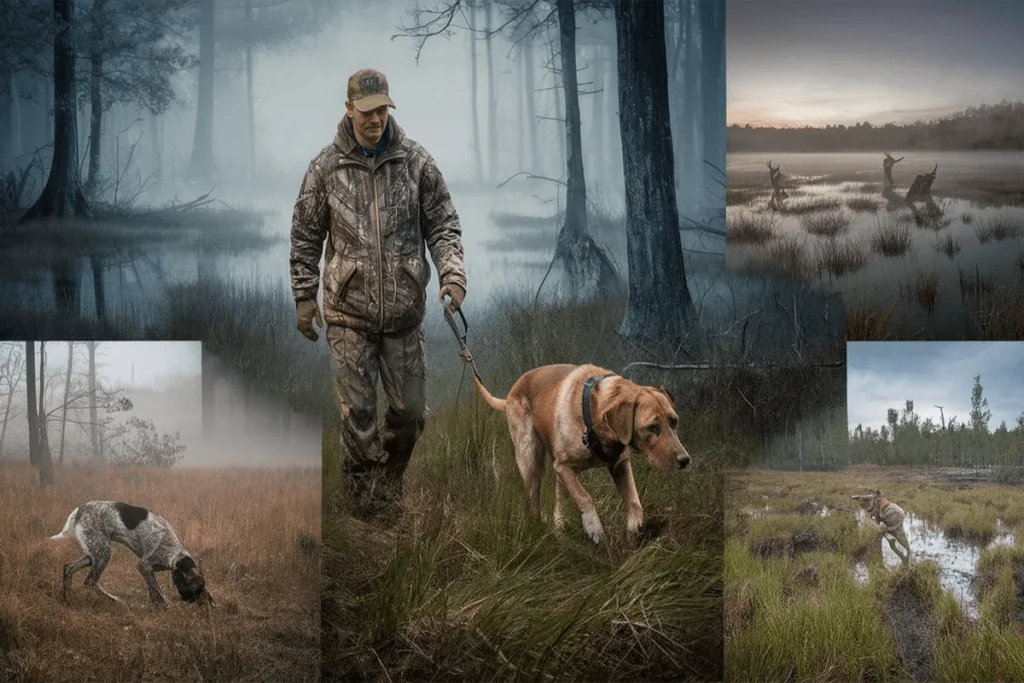
A dog’s hunting instinct isn’t just about chasing prey. It also includes an understanding of teamwork. The best hunting dogs work closely with their owners, following commands while still relying on their instincts to make quick decisions in the field. Without a strong hunting drive, a dog may struggle to stay focused or perform well under real hunting conditions.
Hunting Dogs Tracking Abilities
Tracking is one of the most important skills for many hunting breeds. Scent hounds, such as Bloodhounds and Beagles, use their powerful noses to follow trails for miles. These dogs can pick up even the faintest scent and track wounded game, making them invaluable for hunters who need to recover animals after a shot.
Retrievers and pointers also use their noses to locate game, but they rely on different tracking methods. Retrievers focus on marking downed birds and quickly fetching them, while pointers and flushers help hunters locate live birds before a shot. A strong tracking ability allows hunting dogs to excel in the field, whether they’re following a deer’s scent trail or pinpointing a fallen duck in thick brush.
Hunting Dogs Loyalty and Trainability
Loyalty and trainability determine how well a hunting dog responds to commands and bonds with its owner. The best hunting dogs don’t just work hard in the field; they also form deep connections with their handlers. This loyalty ensures that the dog stays focused on the hunt, follows directions, and remains reliable under pressure.
Some breeds, like the Labrador Retriever and Golden Retriever, are eager to please and easy to train, making them excellent choices for beginner hunters. Others, like the Weimaraner, have strong independent streaks and require consistent training from an experienced owner. Training a hunting dog involves teaching basic obedience, introducing them to the sounds of gunfire, and gradually developing their hunting skills through structured drills.
A highly trainable and loyal hunting dog becomes more than just a working animal—it becomes a trusted companion. With the right training and socialization, these dogs will give their best effort every time they step into the field.
The Top 10 Best Hunting Dogs
1. Labrador Retriever – Master of Game Retrieval and Waterfowl Hunting
Labrador Retrievers dominate the world of hunting dogs. Hunters trust them for their intelligence, eagerness to please, and exceptional retrieval skills. These dogs thrive in waterfowl hunting, retrieving ducks and geese from lakes, rivers, and marshes with ease. Their thick, water-resistant coats keep them warm in cold conditions, while their powerful build allows them to swim through rough waters.
Beyond waterfowl hunting, Labs also excel at upland game retrieval. Their strong noses help them locate birds, and their soft mouths allow them to carry game without causing damage. With proper training, a Labrador Retriever becomes an unstoppable hunting companion, always ready to track and retrieve with precision.
2. German Shorthaired Pointer – The Versatile Gun Dog with Exceptional Hunting Instincts
The German Shorthaired Pointer (GSP) stands out as one of the most well-rounded hunting dogs. Hunters rely on them for their speed, agility, and unmatched endurance. These dogs can track, point, retrieve, and even flush birds, making them ideal for both upland game hunting and waterfowl retrieval.
GSPs have an incredible sense of smell, allowing them to locate birds hidden in dense brush. When they lock onto a scent, they freeze into a steady point, signaling hunters to prepare for the shot. Their versatility makes them a top choice for hunters who want a single dog that can do it all—whether it’s hunting pheasants, ducks, or even deer.
3. Beagle – A Small but Skilled Scent Hound for Tracking Game
Don’t let the Beagle’s size fool you—this small hound possesses one of the best noses in the hunting world. Beagles specialize in tracking rabbits, hares, and other small game, using their keen sense of smell to follow trails for miles. Their persistence and determination make them outstanding hunting companions for those who enjoy small game hunting.
Beagles work in packs or solo, tirelessly following a scent trail with incredible accuracy. Their baying voice alerts hunters when they’ve locked onto prey, helping track animals in thick brush. Their friendly nature and adaptability also make them great household pets when they’re not in the field.
4. Bloodhound – The Ultimate Tracker with Exceptional Scenting Abilities
Bloodhounds rank among the best scent-tracking dogs in history. Law enforcement uses them for search-and-rescue missions, but hunters value them for their ability to track wounded game. These dogs can pick up even the faintest scent and follow it for miles, making them invaluable for big-game hunters.
Their loose, wrinkled skin and long ears help trap scents, allowing them to stay on a trail longer than most breeds. When a Bloodhound locks onto a scent, it stays committed until it finds the target. Hunters who need a dependable tracking dog for deer, boar, or bear hunting trust the Bloodhound’s unmatched nose.
5. Coonhound – A Specialized Tracker for Raccoon and Big-Game Hunting
Coonhounds, including Black and Tan, Redbone, and Bluetick varieties, excel at hunting raccoons and other nocturnal prey. These hounds have incredible endurance, chasing game through rugged terrain and treeing their targets. Once a coonhound corners a raccoon in a tree, it barks loudly to signal the hunter.
Coonhounds also track larger game like mountain lions, bears, and wild boars. Their determination and sharp instincts allow them to work through dense forests, swamps, and rocky landscapes. Their high energy and strong prey drive make them ideal for hunters who enjoy long, challenging hunts.
6. English Springer Spaniel – The Skilled Bird Dog with Superior Flushing Ability
English Springer Spaniels shine in upland bird hunting. Their primary job involves flushing game birds—like pheasants, quail, and grouse—from dense brush so hunters can take a clear shot. Unlike pointers that freeze on a scent, Springers rush forward and flush birds into the air.
These dogs move quickly and cover large areas with ease. Their enthusiasm and boundless energy keep them engaged throughout long hunting trips. English Springer Spaniels also retrieve birds after the shot, making them a well-rounded choice for those who prefer a flushing dog with retrieving skills.
7. Golden Retriever – The Intelligent and Reliable Game Retriever
Golden Retrievers may be famous as friendly family pets, but they also rank among the best hunting dogs. Like Labradors, they excel in waterfowl hunting, retrieving ducks and geese from lakes and rivers. Their strong swimming ability and soft mouths make them perfect for delicate game retrieval.
Golden Retrievers also work well as upland game dogs, flushing and retrieving birds in the field. They are smart and want to make you happy, so they learn quickly. Hunters who want a loyal and affectionate dog that performs well both in and out of the field often choose the Golden Retriever.
8. Brittany Spaniel – The Agile and High-Energy Upland Bird Hunter
Brittany Spaniels bring speed, agility, and sharp hunting instincts to the field. These compact, athletic dogs specialize in upland bird hunting, covering vast areas in search of quail, pheasants, and partridges. Their strong noses help them locate birds, and their pointing ability signals hunters when they find prey.
Brittanys possess incredible stamina, making them ideal for hunters who spend long hours in the field. Their energetic and eager-to-please nature makes training a breeze. If you want a hardworking and affectionate hunting dog, the Brittany Spaniel delivers in every category.
9. Weimaraner – The Loyal and High-Energy Big-Game Hunter
The Weimaraner, known as the “Gray Ghost,” brings speed, endurance, and intelligence to the hunt. Originally bred for big-game hunting, Weimaraners excel at tracking deer, boar, and other large prey. Their sleek, muscular build allows them to move quickly across rough terrain.
These dogs form strong bonds with their owners, often becoming protective companions. They require firm training and plenty of exercise to stay focused in the field. Their natural hunting instincts, paired with their loyal nature, make them a fantastic choice for experienced hunters.
10. Chesapeake Bay Retriever – The Tough and Tenacious Waterfowl Hunter
Chesapeake Bay Retrievers thrive in extreme hunting conditions. Bred to retrieve waterfowl in icy waters, these dogs have thick, waterproof coats and powerful muscles that help them swim against strong currents. They handle cold weather better than most retrievers, making them perfect for late-season duck and goose hunting.
Unlike other retrievers, Chessies possess a more independent streak, requiring firm training and leadership. Their determination and protective nature make them excellent working dogs and loyal companions. Hunters who need a tough, determined retriever for harsh environments won’t find a better choice than the Chesapeake Bay Retriever.
Each of these hunting dogs brings unique skills to the field. Whether you need a retriever for waterfowl, a pointer for upland birds, or a scent hound for tracking game, you can count on these breeds to perform at the highest level. Choose the right dog for your hunting style, train it well, and you’ll have a loyal partner that will never let you down.
Choosing the Right Hunting Dog for Your Needs
Hunting Style Matters
Every hunter follows a unique approach, and different dog breeds excel in specific hunting styles. Before choosing a hunting dog, you need to consider the type of game you pursue and the terrain where you hunt.
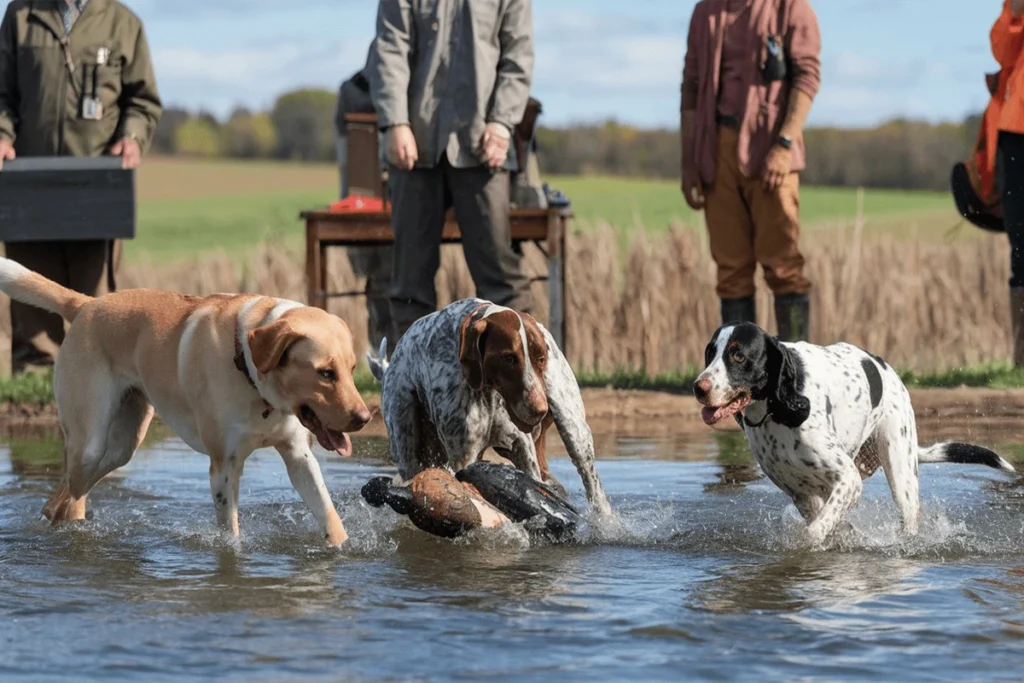
- Waterfowl Hunters need strong swimmers with excellent retrieval instincts. Breeds like Labrador Retrievers, Chesapeake Bay Retrievers, and Golden Retrievers thrive in wet environments, retrieving ducks and geese from lakes, rivers, and marshes. Their thick, water-resistant coats and webbed feet give them an advantage in cold, icy waters.
- Upland Bird Hunters require agile and energetic dogs that can locate and flush birds from tall grass or dense brush. Pointers, setters, and spaniels, such as the German Shorthaired Pointer, Brittany Spaniel, and English Springer Spaniel, cover large areas quickly and alert hunters when they find game.
- Big-Game Hunters need scent hounds or tracking dogs that can follow wounded animals over long distances. Bloodhounds, Coonhounds, and Weimaraners excel at tracking deer, boar, or even bears, helping hunters locate their targets in rugged terrain.
- Small Game Hunters prefer dogs with sharp noses and high endurance for tracking rabbits and other small animals. Beagles and Basset Hounds specialize in trailing small game, using their powerful scenting abilities to follow animals through fields, forests, and rocky landscapes.
Matching your hunting dog’s abilities with your hunting style ensures a successful and enjoyable experience in the field.
Best Hunting Dogs for Beginners
First-time hunting dog owners need breeds that are easy to train, highly obedient, and adaptable to different hunting environments. Some dogs have a strong independent streak, requiring experienced handlers, while others respond well to training and develop into reliable partners with minimal effort.
- Labrador Retrievers stand out as one of the best choices for beginners. They learn commands quickly, respond well to positive reinforcement, and show natural retrieving instincts, making them perfect for waterfowl hunting.
- Golden Retrievers share similar qualities with Labradors but offer a slightly softer temperament. Their intelligence and eagerness to please make training straightforward, and they excel in both waterfowl and upland bird hunting.
- Beagles make excellent beginner-friendly scent hounds. Their strong tracking skills and friendly nature allow new hunters to experience small game hunting without dealing with an overly stubborn or challenging breed.
- Brittany Spaniels provide a great option for first-time upland bird hunters. They possess a high energy level but stay eager to learn and work alongside their owners, making training enjoyable.
Beginner hunters should avoid highly independent breeds like Weimaraners and Chesapeake Bay Retrievers unless they’re prepared for the extra effort required in training. Choosing an easy-to-train hunting dog increases the chances of building a strong bond and achieving success in the field.
Field Trials and Training For Hunting Dogs
Proper training transforms a good hunting dog into an exceptional one. Field trials and structured training sessions help dogs refine their skills, improve discipline, and prepare for real hunting situations.
- Obedience Training lays the foundation for a reliable hunting dog. Commands like “sit,” “stay,” “come,” and “heel” teach dogs to follow directions and remain controlled in the field. A well-trained dog stays focused and doesn’t chase game recklessly or disobey critical commands.
- Retrieval and Tracking Drills sharpen a dog’s ability to locate, retrieve, and deliver game efficiently. Waterfowl hunters often use dummies and scent-based training to reinforce retrieving behavior, while scent hound trainers create controlled scent trails for tracking practice.
- Gunfire Introduction ensures a dog remains calm around loud sounds. Early exposure to gunshots through gradual training prevents fear and anxiety, allowing the dog to stay focused when it matters most.
- Field Trials simulate real hunting conditions, testing a dog’s ability to track, point, retrieve, and work under pressure. These competitions evaluate a dog’s skill level, obedience, and natural instincts, helping hunters refine their dog’s performance.
Investing time in proper training and field trials builds confidence in both the dog and the hunter. A well-trained hunting dog increases success rates, making every hunt more enjoyable and efficient.
By choosing the right dog for your hunting style, selecting a beginner-friendly breed if needed, and dedicating time to structured training, you’ll develop a loyal and skilled hunting companion that enhances every outdoor adventure.
Training and Caring for Your Hunting Dog
Hunting Dog Training Basics
Training a hunting dog requires patience, consistency, and a clear understanding of the skills your dog needs in the field. Without proper training, even the most instinct-driven hunting breeds struggle to perform efficiently.
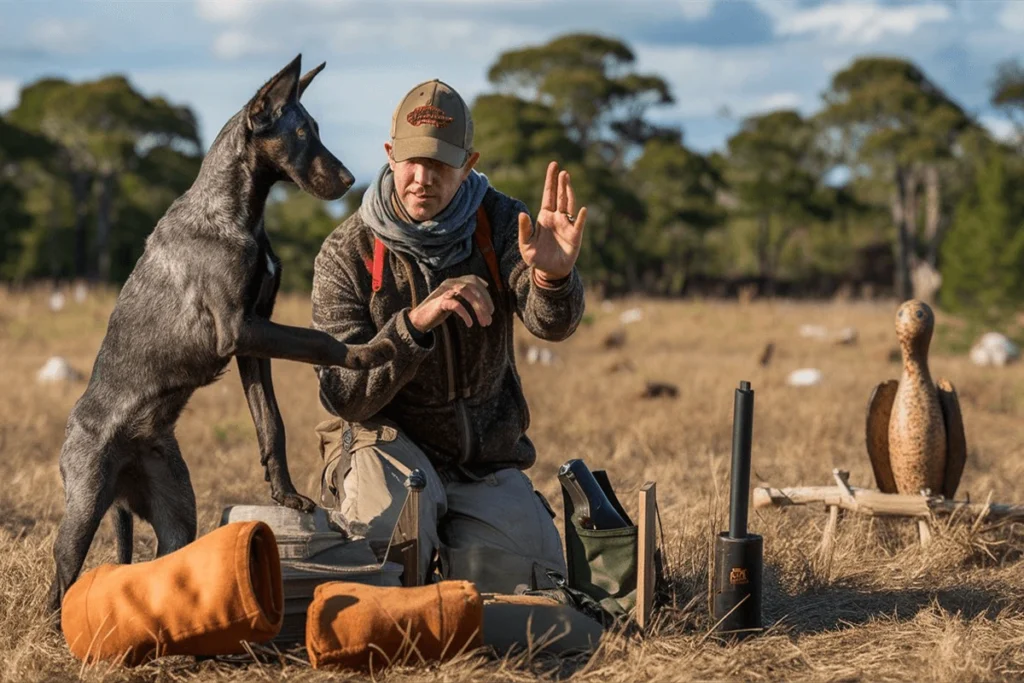
- Start with Obedience Training – Before introducing advanced hunting commands, teach essential obedience skills like “sit,” “stay,” “heel,” and “come.” A dog that listens to commands without hesitation stays safer in the field and responds quickly when tracking or retrieving game.
- Use Positive Reinforcement – Reward-based training builds trust and strengthens your dog’s desire to work with you. Praise, treats, and toys encourage good behavior, while harsh corrections can create fear or stubbornness.
- Introduce Scent and Tracking Drills – Scent-based training lays the foundation for tracking and retrieving. Start by using scented dummies or game-scented cloths to encourage your dog to follow a trail. Gradually increase the difficulty by hiding the objects in tall grass, thick brush, or water.
- Teach Gunfire Tolerance – Many dogs react nervously to loud noises, so introduce gunfire gradually. Begin by clapping or making soft popping noises while rewarding calm behavior. Progress to recorded gunfire sounds before eventually exposing your dog to real gunfire at a safe distance.
- Simulate Hunting Conditions – Expose your dog to different environments, such as water, dense woods, and open fields. Practicing in real hunting scenarios improves confidence and sharpens instincts. Use live or dummy birds, scent trails, and retrieval drills to create a realistic training experience.
- Work on Retrieval Skills – For retrievers and flushing breeds, reinforce fetching and delivery to hand. Start with short retrieves and gradually increase distance and difficulty. If your dog hesitates to release the game, use the “give” command and reward compliance.
Consistent training keeps your hunting dog sharp and reliable. Reinforce skills regularly to maintain discipline and ensure peak performance during hunting season.
Exercise and Mental Stimulation For Hunting Dogs
Hunting dogs possess high energy levels and require consistent physical activity to stay fit. Without regular exercise, they become restless, frustrated, or even destructive.
- Daily Running and Walking – Long walks, jogs, or off-leash runs allow your dog to burn excess energy. Hunting breeds thrive on endurance-building activities that mimic field conditions.
- Retrieving Drills and Swimming – Water-loving breeds like Labrador Retrievers and Chesapeake Bay Retrievers benefit from regular swimming sessions. Water retrieves build strength, endurance, and confidence for waterfowl hunting.
- Agility and Field Exercises – Setting up obstacle courses or practicing fieldwork sharpens a dog’s ability to maneuver through different terrains. Jumping over logs, weaving through brush, and climbing small hills simulate real hunting conditions.
- Scent and Puzzle Games – Mental stimulation matters just as much as physical exercise. Hide treats, use puzzle toys, or set up scent trails to keep your dog’s mind engaged. Scent hounds and retrievers especially benefit from nose work exercises that reinforce their tracking abilities.
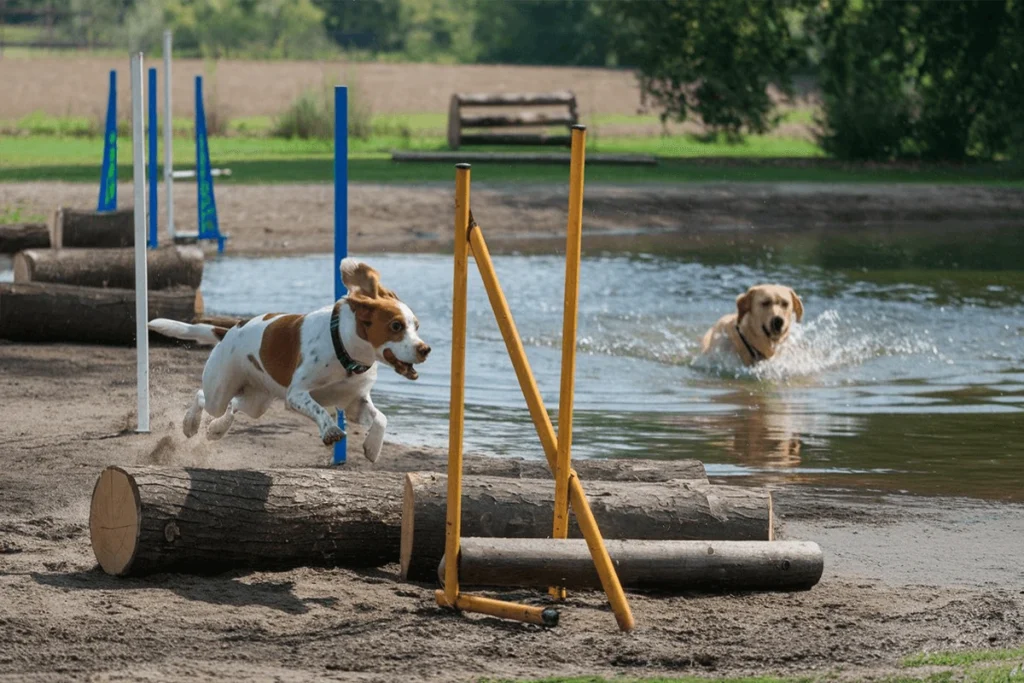
Hunting dogs stay happiest and healthiest when they receive both physical and mental stimulation. Keeping them active prevents boredom, improves stamina, and ensures they perform at their best in the field.
Hunting Dogs Health and Nutrition
A well-balanced diet and proper healthcare keep your hunting dog strong, energetic, and ready for the hunt.
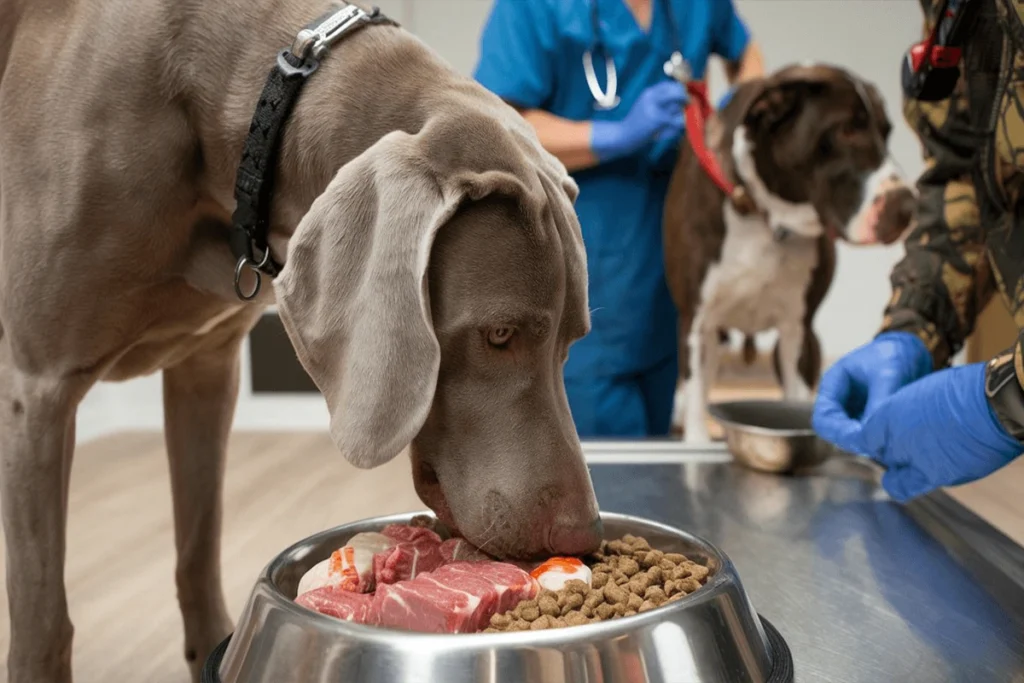
- Provide High-Quality Protein – Hunting dogs need lean protein to support muscle growth and endurance. Look for dog foods that contain real meat, such as chicken, beef, fish, or venison, rather than fillers like corn or wheat.
- Include Healthy Fats – Fat provides energy for long hunts and maintains a healthy coat. Omega-3 and omega-6 fatty acids, found in fish oil and flaxseed, improve joint health and keep skin and fur in top condition.
- Monitor Portion Sizes – Hunting dogs require different amounts of food depending on their activity level. During hunting season, increase their food intake to match the extra calories burned in the field. In the offseason, reduce portions to prevent unnecessary weight gain.
- Stay Hydrated – Always provide access to fresh, clean water. Hunting dogs dehydrate quickly, especially during long hunts in warm weather. Carry a portable water bottle and bowl when training or hunting.
- Schedule Regular Vet Checkups – Routine veterinary visits help catch health issues early. Keep up with vaccinations, flea and tick prevention, and joint health screenings, especially in older dogs.
- Check for Injuries – After every hunt, inspect your dog’s paws, ears, and coat for cuts, burrs, or ticks. Field conditions expose dogs to rough terrain, sharp objects, and parasites. Address any injuries immediately to prevent infections.
Proper nutrition, hydration, and medical care extend your hunting dog’s lifespan and keep them in peak condition. A healthy dog works harder, recovers faster, and remains a loyal hunting companion for years to come.
By focusing on consistent training, daily exercise, and proper nutrition, you ensure that your hunting dog stays strong, skilled, and ready for every adventure in the field.
Conclusion
Selecting the right hunting dog requires more than just picking a breed—you need to match your dog’s instincts, energy level, and skills with your preferred hunting style. Whether you need a waterfowl retriever, a small game scent hound, or an all-purpose gun dog, the right choice ensures a seamless partnership in the field.
A well-trained hunting dog doesn’t just enhance the hunt; it strengthens the bond between hunter and canine. Proper training, regular exercise, and mental stimulation keep your dog sharp, disciplined, and eager to work. Field trials, scent tracking drills, and retrieval exercises prepare your dog for real-world hunting scenarios, ensuring reliability when it matters most.
Beyond training, health and nutrition play a crucial role in keeping your hunting dog in peak condition. A well-balanced diet with high-quality protein and essential fats fuels endurance, while regular vet checkups and injury prevention keep them strong for years of hunting adventures.
The most successful hunters recognize that their dogs aren’t just tools—they’re loyal partners, devoted companions, and indispensable members of the hunting experience. By investing in proper care, training, and understanding your dog’s strengths, you create a hunting duo that never lets you down.
No matter your experience level or hunting preference, the right dog will not only track, retrieve, and flush game but also become a lifelong friend—one that makes every hunting trip more rewarding. With patience, dedication, and the right approach, your hunting dog will prove to be the most trustworthy and skilled companion you could ever ask for in the great outdoors.
Learn More Tips and Ideas on How to Care for your Hunting Dog From Here
Discover the Best Stuff For your Dog on PetMD Official
